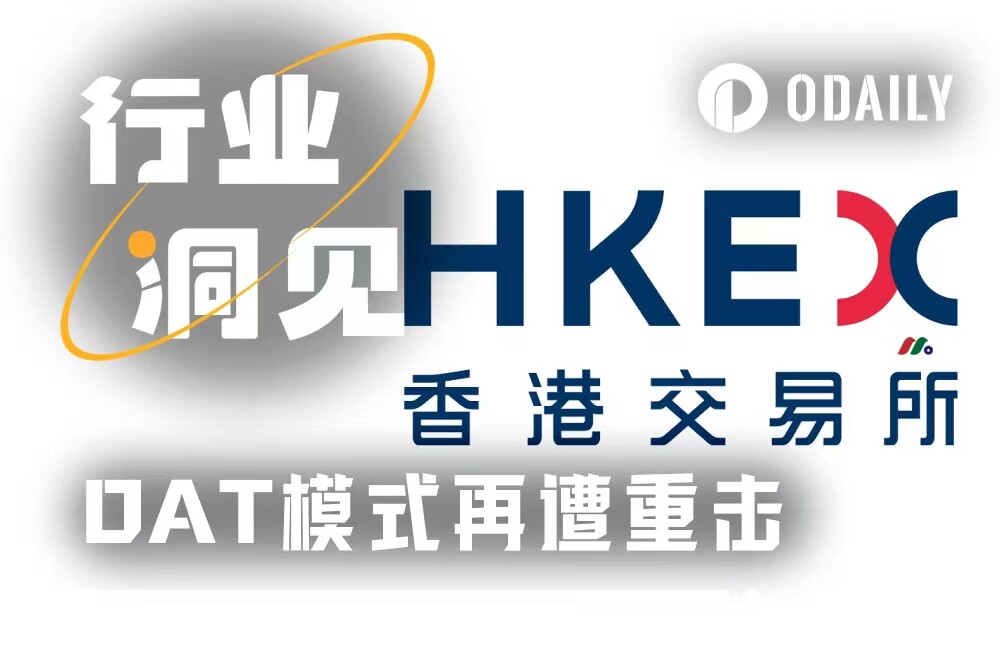The DAT strategy suffered another blow, and the Hong Kong Stock Exchange said no to "pure coin hoarding companies"
- 核心观点:亚太交易所集体抵制上市公司转向加密财库策略。
- 关键要素:
- 港交所拒绝至少五家DAT转型申请。
- 美SEC调查200余家DAT策略公司。
- QMMM因涉嫌操纵股价被勒令停牌。
- 市场影响:抑制概念炒作,推动行业合规化发展。
- 时效性标注:中期影响
Original | Odaily Planet Daily ( @OdailyChina )
By Wenser ( @wenser 2010 )
This morning, Bloomberg reported that the three major Asia-Pacific stock exchanges, including the Hong Kong Stock Exchange (HKEX), are opposing listed companies' shifts to decentralized asset management (DAT) companies. A HKEX spokesperson subsequently responded, stating that the HKEX framework must ensure that all applicants seeking listings, as well as those already listed, have viable, sustainable, and substantive businesses and operations. The exchange has recently rejected at least five companies' strategic plans to transition to DATs. Combined with previous news of the suspension of trading of US-listed QMMM Holdings' stock and the closure of its Hong Kong office , many listed companies implementing DAT strategies, from "dual cultivation of cryptocurrencies and stocks" to the failure of accumulating cryptocurrencies, may need to find new solutions. Odaily Planet Daily will provide a brief analysis of this incident in this article.
When the Hong Kong Stock Exchange pressed the pause button on the "DAT strategy" for listed companies
Judging from the news, the boycott of DAT listed companies launched by stock exchanges such as the Hong Kong Stock Exchange, India, and Australia is not accidental, but an inevitable move based on long-standing precedents and careful consideration.
The US SEC and Nasdaq have already tightened the "DAT strategy window for listed companies"
In early September, we reported in the article "From Rush to Regulation: US Regulators Begin to Cool Down the 'Crypto Fever' Among Publicly Listed Companies" that the US SEC, Nasdaq, and other regulatory agencies have stepped up their oversight of listed companies holding large amounts of cryptocurrencies and high-risk companies suspected of money laundering. Furthermore, according to a report in late September by the Wall Street Journal, the SEC, in conjunction with the Financial Industry Regulatory Authority (FINRA), has conducted contact investigations into over 200 companies employing DAT strategies.
Around the same time, on September 9th, Nasdaq-listed QMMM Holdings (NASDAQ:QMMM) announced plans to invest $100 million in a cryptocurrency reserve. Subsequently, its stock price surged 9.6-fold within three weeks. At the end of September, the US SEC, alleging the company was using social media platforms to manipulate its stock price, ordered a trading halt effective September 29th, which remains in effect. Recently, a Caixin reporter visited the company's Hong Kong headquarters and found it deserted. Upon contacting staff at another nearby company, they stated that the company had relocated in September and the relocation was unknown.
Earlier, in August of this year, Windtree Therapeutics (WINT), a US-listed BNB treasury company, was delisted from Nasdaq on August 21st after its stock price remained below $1 for an extended period, following multiple reverse splits and failing to meet the usual grace period. (Recommended reading: "BNB Reserve-listed company WINT delists; 'hoarding' strategy fails to cure all ills" )
From Strategy's "BTC hoarding strategy" being imitated by many listed companies, to ETH treasury companies such as Sharplink and Bitmine leading the "ETH hoarding craze", in just about 3-4 months, many DAT listed companies have passed the initial frenzied hype stage and entered the "market value measurement" stage.
The failure of the “DAT strategy” leads to the dismal revenue performance of listed companies.
As the old saying goes: "When the tide goes out, you discover who's swimming naked."
For many companies listed on the US and Hong Kong stock markets, the truth reflected in this sentence is particularly cruel.
Take the Nasdaq-listed company QMMM mentioned above as an example. According to financial reports on the US SEC website, the company's operating revenue in 2022, 2023, and 2024 was projected to be $3.396 million, $2.8079 million, and $2.6982 million, respectively. It achieved a net profit of $800,600 in 2022, and recorded net losses of $1.2912 million and $1.5802 million in 2023 and 2024, respectively. Despite previously announcing plans to invest $100 million in Bitcoin, Ethereum, and SOL, its latest annual report shows that as of the end of 2024, the company held only $498,000 in cash and cash equivalents. As of September 30, 2024, QMMM's total assets were only $5.974 million.
Similar data is not uncommon. Previously, Dingdang, a writer for Odaily's Planet Daily, systematically analyzed the market capitalization inversion phenomenon of numerous DAT listed companies in his article "In-depth Analysis of the Crypto-Stock Market Value Inversion: Value Hollow or Capital Illusion?"
Behind these phenomena lies the illusion and reality of numerous companies with no real business support, merely listed companies with no real revenue, hyped up by "DAT concept stocks," resulting in skyrocketing stock prices and the resulting "helplessness" of ordinary investors. According to a recent report by 10X Research, a Singapore-based crypto investment research firm, retail investors have lost approximately $17 billion in DAT trading. The Hong Kong Stock Exchange's tightening of DAT listing applications is undoubtedly a helpless move to protect ordinary investors.
The future of DAT strategy: having real business support and proving the necessity of coin hoarding business
As of now, the windows for DAT listed companies in Hong Kong, India, Australia, the United Kingdom and other places are tightening.
- According to Rule 14.82 of the Hong Kong Stock Exchange's rules , if a listed company's assets consist primarily of cash or short-term investment products, it will be considered a "cash company" and may be suspended from trading. This rule is intended to prevent shell companies from exploiting their listed company status for profit;
- In September, India's Bombay Stock Exchange rejected Jetking Infotrain 's application for a preferential allotment of shares after the company said it would invest part of the proceeds in cryptocurrencies.
- Australia's ASX Ltd. exchange also recently stated that it prohibits listed companies from having cash or cash-like assets accounting for 50% or more of their balance sheets; the CEO of Australian listed company Locate Technologies Ltd said that this clause makes the use of DAT "basically impossible."
- In addition, according to people familiar with the matter, there are regulations that prohibit listed companies in former British territories from transforming into pure "coin hoarding companies."
In contrast, the Japanese Stock Exchange is relatively open to DAT strategies, but there are currently different opinions.
According to Hiromi Yamaji, CEO of Japan Exchange Group, at the end of September, "If a listed company makes appropriate disclosures about actions such as purchasing BTC, it is difficult to strictly define such behavior as not permitted." In contrast, Japan currently has 14 listed companies holding BTC, ranking first in Asia.
However, regarding Metaplanet, a representative Japanese listed company that has implemented a "BTC hoarding strategy," MSCI Inc. (Morgan Stanley Capital International), a renowned global index company, offered a different response. In February of this year, Metaplanet, primarily focused on its hotel operations, was selected for inclusion in the MSCI Japan Small Cap Index. Subsequently, Metaplanet continued to acquire Bitcoin. This move drew the disapproval of MSCI, which recently proposed excluding large DAT listed companies from its global indexes.
According to Simon Hawkins, a partner at the law firm Latham & Watkins, for many potential cryptocurrency storage companies, whether they can successfully obtain regulatory approval may depend mainly on whether they can "prove that buying crypto assets is an important part of their business operations."
In summary, strictly controlling the proportion of cryptocurrency assets in the company's balance sheet and explaining in detail to regulators the necessity of purchasing cryptocurrency assets to support their own business will be a compulsory course for future DAT listed companies.
Recommended Reading
Hong Kong crypto treasury company QMMM was ordered to suspend trading by the US SEC



